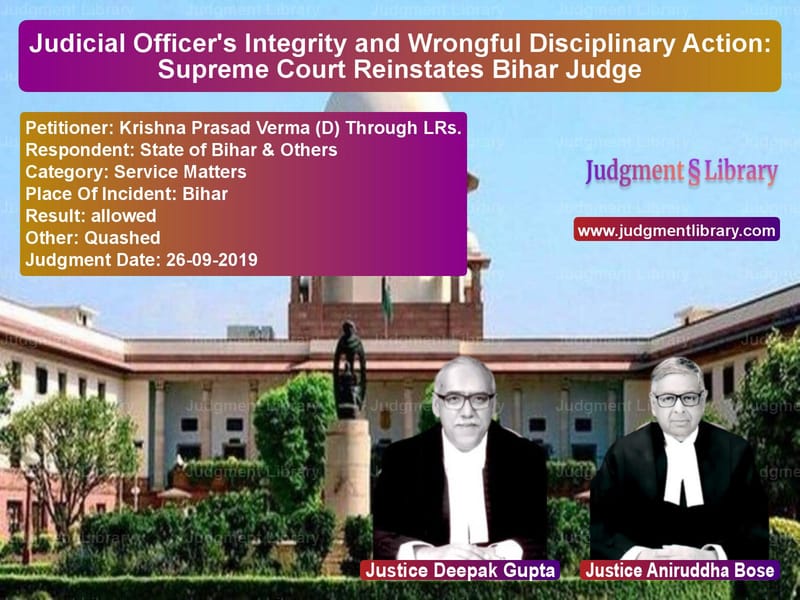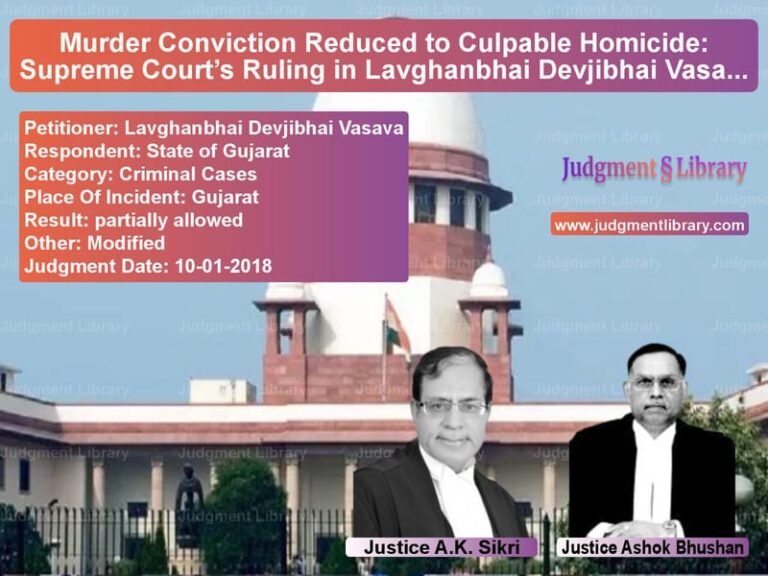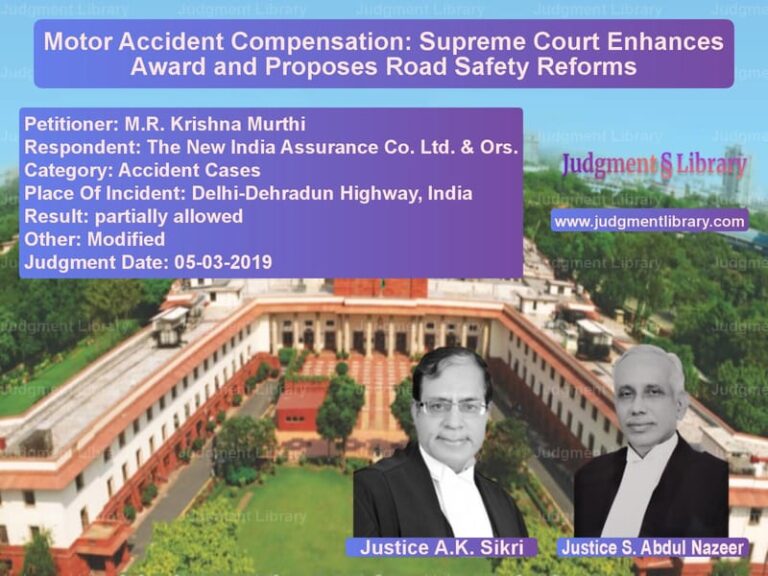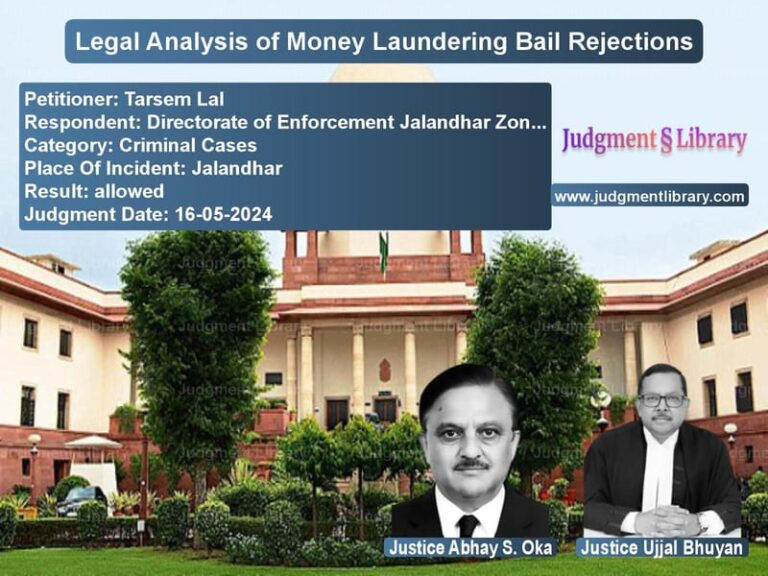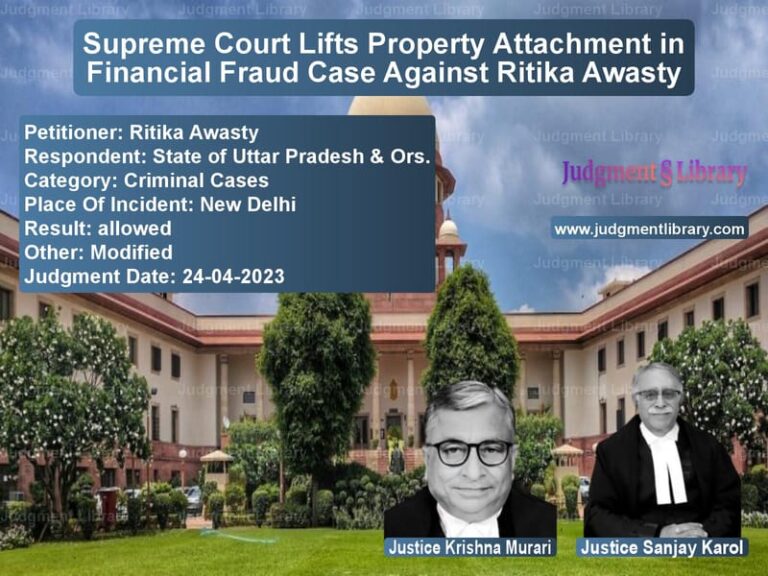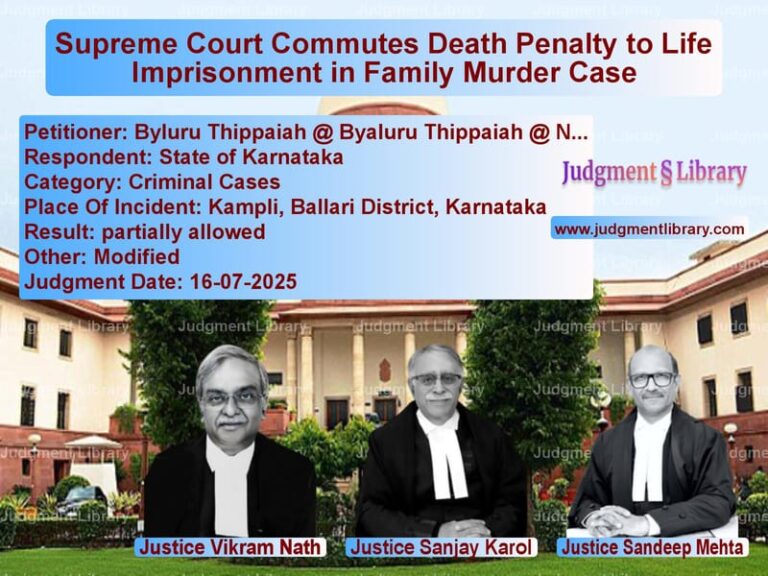Judicial Officer’s Integrity and Wrongful Disciplinary Action: Supreme Court Reinstates Bihar Judge
The Supreme Court of India, in the case of Krishna Prasad Verma (D) Through LRs. vs. State of Bihar & Others, delivered a significant ruling on judicial independence and wrongful disciplinary action against a judicial officer. The case revolved around the wrongful dismissal of a judge based on decisions taken in bail and narcotics cases, which the Supreme Court ruled as an unjustified disciplinary action.
Background of the Case
The appellant, Krishna Prasad Verma, was an Additional District and Sessions Judge in Chapra, Bihar. He faced disciplinary proceedings based on two allegations:
- Granting bail to three accused persons in a murder case despite their earlier bail petitions being rejected by the High Court.
- Closing evidence prematurely in a narcotics case under the Narcotic Drugs and Psychotropic Substances (NDPS) Act, 1985, leading to the acquittal of the accused.
Based on these allegations, disciplinary action was initiated against him, culminating in his dismissal from service. The High Court of Patna upheld the disciplinary action. The appellant, through his legal representatives (LRs), challenged the decision before the Supreme Court.
Key Legal Questions Considered
- Whether disciplinary action can be taken against a judicial officer for passing incorrect orders without proof of extraneous influence or corruption.
- Whether the appellant’s decision to grant bail or close evidence in the NDPS case constituted judicial misconduct.
- Whether the High Court of Patna erred in upholding the dismissal of the appellant.
Arguments by the Petitioner (Krishna Prasad Verma’s LRs)
The appellant’s legal representatives contended:
- The officer was wrongly dismissed for passing judicial orders, which falls within his jurisdiction.
- No evidence existed to suggest that the orders were passed due to extraneous considerations or corrupt motives.
- The High Court failed to differentiate between an incorrect judicial decision and misconduct.
- His dismissal was based purely on an administrative review of his judicial work rather than proven misconduct.
Arguments by the Respondent (State of Bihar)
The respondents argued:
- The officer had ignored previous High Court orders denying bail to the accused, showing judicial indiscipline.
- In the NDPS case, he closed evidence prematurely without exhausting all means to secure the attendance of prosecution witnesses.
- His conduct was detrimental to the administration of justice, warranting strict disciplinary action.
Supreme Court’s Observations
The Supreme Court carefully examined the allegations and made the following key observations:
- Judicial officers must be protected from administrative interference in their decision-making.
- Passing incorrect orders does not automatically amount to misconduct unless there is proof of corruption, malice, or extraneous considerations.
- Referring to previous judgments, the Court reiterated that judicial officers cannot be held liable for errors in their rulings unless motivated by personal gain or external pressure.
- In the bail case, the Court noted that the Public Prosecutor did not oppose bail, which was a critical factor in the judge’s decision.
- In the NDPS case, the Court found that the officer had given the prosecution 18 opportunities to present witnesses before closing the evidence.
Final Judgment
The Supreme Court set aside the disciplinary actions and reinstated the judicial officer with all consequential benefits. The Court held:
“Unless there are clear-cut allegations of misconduct, extraneous influences, gratification of any kind, disciplinary proceedings should not be initiated merely on the basis that a wrong order has been passed by the judicial officer.”
The Court awarded Rs. 25,000 as costs in favor of the appellant.
Implications of the Judgment
- For Judicial Officers: The ruling reinforces that judicial decisions should not be subject to administrative interference unless misconduct is proven.
- For High Courts: The judgment sets guidelines to differentiate between judicial error and misconduct in disciplinary proceedings.
- For Governance: The decision strengthens judicial independence and prevents the misuse of administrative power to target judges.
Conclusion
The Supreme Court’s ruling in this case protects judicial officers from undue administrative actions based on their judicial work. By quashing the dismissal, the Court has reinforced the importance of judicial independence, ensuring that judges can make decisions without fear of reprisal.
Petitioner Name: Krishna Prasad Verma (D) Through LRs..Respondent Name: State of Bihar & Others.Judgment By: Justice Deepak Gupta, Justice Aniruddha Bose.Place Of Incident: Bihar.Judgment Date: 26-09-2019.
Don’t miss out on the full details! Download the complete judgment in PDF format below and gain valuable insights instantly!
Download Judgment: Krishna Prasad Verma vs State of Bihar & Oth Supreme Court of India Judgment Dated 26-09-2019.pdf
Direct Downlaod Judgment: Direct downlaod this Judgment
See all petitions in Disciplinary Proceedings
See all petitions in Public Sector Employees
See all petitions in Termination Cases
See all petitions in Judgment by Deepak Gupta
See all petitions in Judgment by Aniruddha Bose
See all petitions in allowed
See all petitions in Quashed
See all petitions in supreme court of India judgments September 2019
See all petitions in 2019 judgments
See all posts in Service Matters Category
See all allowed petitions in Service Matters Category
See all Dismissed petitions in Service Matters Category
See all partially allowed petitions in Service Matters Category

